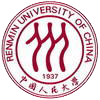Beijing Night Life
Beijing's nightlife and entertainment scene has now recovered from the moral clampdown following the Communist takeover where at that time entertainment was limited to fancy hotels. Since then China's economic boom has brought countless entertainment venues offering something for all tastes from bars, discos, karaoke, and teahouses, to form the backbone of Beijing's rich and colorful nightlife.
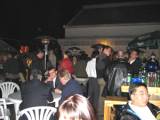 Beijing has quite the bar and nightclub scene, including The Vogue playing techno and house music for serious clubbers; Havana and Salsa Cabana playing groovy South American music; and Vics, Mix and The Loft playing house and club music for those who want to dance all night. Most venues stay open until 2 or 3 in the morning, though some stay open till dawn. Beijing has quite the bar and nightclub scene, including The Vogue playing techno and house music for serious clubbers; Havana and Salsa Cabana playing groovy South American music; and Vics, Mix and The Loft playing house and club music for those who want to dance all night. Most venues stay open until 2 or 3 in the morning, though some stay open till dawn.
Concentrated mostly in the downtown, Chaoyang area, there are some bars and clubs in Haidian. The ones in Chaoyang offer a nicer atmosphere, but the prices are generally more expensive. Most bars are open during the day as restaurants.
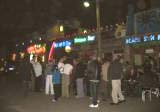 In 1995 there was one bar at the south end of Sanlitun (Three Mile Village), and it was losing money. A new manager bought it, believing the place had potential but that the feng shui was wrong because the toilet was opposite the door and all the wealth was going down it. He then changed the name, relocated the washroom, and so revolutionized the city's nightlife. Now the area, nestled in the Embassy District, is choked with bars, with new ones opening all the time. Originally aimed at the city's foreign community, they are now patronized as much by locals. In 1995 there was one bar at the south end of Sanlitun (Three Mile Village), and it was losing money. A new manager bought it, believing the place had potential but that the feng shui was wrong because the toilet was opposite the door and all the wealth was going down it. He then changed the name, relocated the washroom, and so revolutionized the city's nightlife. Now the area, nestled in the Embassy District, is choked with bars, with new ones opening all the time. Originally aimed at the city's foreign community, they are now patronized as much by locals.
An alternative bar scene exists in Haidian District , around the university quarters in the northwest. With a largely student clientele, the bars here are cheaper and more hip.
There are plenty of movie theatres playing Chinese and foreign films. Most of the films have subtitles. The cinemas are much like those in North America. The only difference is you can choose whether you want sweet or salty popcorn.
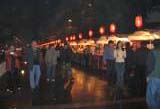 Beijing's open-air night snack markets are open all year round. These markets provide real life accounts of how the Chinese enjoy their evenings and also give the visitor the chance to taste many typical Chinese snacks including tea soup, mutton skewer, and fried glutinous rice cakes. There is a snack market in Dongdan, near Wangfujing, as well as in Donghuamen near the Palace Hotel. Beijing's open-air night snack markets are open all year round. These markets provide real life accounts of how the Chinese enjoy their evenings and also give the visitor the chance to taste many typical Chinese snacks including tea soup, mutton skewer, and fried glutinous rice cakes. There is a snack market in Dongdan, near Wangfujing, as well as in Donghuamen near the Palace Hotel.
Night performance venues such as the Lao She Teahouse, Tianqiao Happy Teahouse, Liyuan Theater, Huguang Guildhall and Beijing Wuyi Diyuan offer a wide repertoire of traditional arts, including Peking Opera, martial arts and other folklore arts. Visitors can watch shows, while eating snacks and drinking tea.
Beijing is loaded with karaokes where one can sing Chinese, Korean, Japanese and English songs, with friends in private settings. Like a living room, nicely decorated with a sound system in place, all you have to do is pick up the mic. Drinks and snacks are served. T hey are generally open from 7pm to 2am, sometimes later.
Providing an array of venues, bars have given a huge boost to the city's music scene. You can now hear classical music, bamboo tunes, jazz, blues, pop or other music anytime of the week. Beijing Concert Hall is a popular venue for classical music and seats 1000 people. Various hotels, such as the Palace Hotel and Jianguo Hotel, offer evening music performances. Traditional Chinese music using instruments like the erhu and pipa can be usually heard at Sanwei Bookstore. Beijing also plays host to an international jazz festival every year.
As the cultural center of China, Beijing plays host to many outstanding Chinese and Western stage performances. These shows are excellent means to enhance mutual understanding and cultural exchange. Performances of different genre from many different countries and regions are staged in Beijing on a regular basis, with most shows beginning at 7:30 pm.
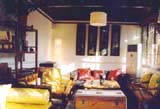
Recently teahouses have seen a big comeback in Beijing. It is now quite fashionable
to go to a traditional teahouse to savour and appreciate tea. The atmosphere in teahouses is usually calm and tranquil.
Some teahouses offer instrumental Chinese music or Peking Opera performances. |


 Beijing has quite the bar and nightclub scene, including The Vogue playing techno and house music for serious clubbers; Havana and Salsa Cabana playing groovy South American music; and Vics, Mix and The Loft playing house and club music for those who want to dance all night. Most venues stay open until 2 or 3 in the morning, though some stay open till dawn.
Beijing has quite the bar and nightclub scene, including The Vogue playing techno and house music for serious clubbers; Havana and Salsa Cabana playing groovy South American music; and Vics, Mix and The Loft playing house and club music for those who want to dance all night. Most venues stay open until 2 or 3 in the morning, though some stay open till dawn. In 1995 there was one bar at the south end of Sanlitun (Three Mile Village), and it was losing money. A new manager bought it, believing the place had potential but that the feng shui was wrong because the toilet was opposite the door and all the wealth was going down it. He then changed the name, relocated the washroom, and so revolutionized the city's nightlife. Now the area, nestled in the Embassy District, is choked with bars, with new ones opening all the time. Originally aimed at the city's foreign community, they are now patronized as much by locals.
In 1995 there was one bar at the south end of Sanlitun (Three Mile Village), and it was losing money. A new manager bought it, believing the place had potential but that the feng shui was wrong because the toilet was opposite the door and all the wealth was going down it. He then changed the name, relocated the washroom, and so revolutionized the city's nightlife. Now the area, nestled in the Embassy District, is choked with bars, with new ones opening all the time. Originally aimed at the city's foreign community, they are now patronized as much by locals. Beijing's open-air night snack markets are open all year round. These markets provide real life accounts of how the Chinese enjoy their evenings and also give the visitor the chance to taste many typical Chinese snacks including tea soup, mutton skewer, and fried glutinous rice cakes. There is a snack market in Dongdan, near Wangfujing, as well as in Donghuamen near the Palace Hotel.
Beijing's open-air night snack markets are open all year round. These markets provide real life accounts of how the Chinese enjoy their evenings and also give the visitor the chance to taste many typical Chinese snacks including tea soup, mutton skewer, and fried glutinous rice cakes. There is a snack market in Dongdan, near Wangfujing, as well as in Donghuamen near the Palace Hotel. 






